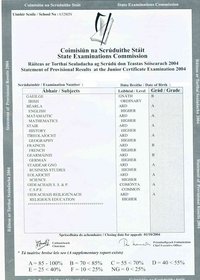Junior Certificate

The JCertificate result sheet
|
|
| Acronym | JC |
|---|---|
| Type | Paper-based |
| Developer / administrator | State Examinations Commission |
| Purpose | To provide a well-balanced, general education to students who wish to enter on more advanced courses of study |
| Year started | 1992 |
| Duration | 1.5-2.5 hours with one exam being 3hrs (per exam) |
| Score / grade range | 0 to 100 |
| Offered | Once a year |
| Languages | English, Irish |
| Annual no. of test takers | 59,522 (2015) |
| Prerequisites / eligibility criteria | At least 12 years of age on year of admission and must have completed primary education |
| Fee | €109 (2016) |
| Website | www |
The Junior Certificate (Irish: Teastas Sóisearach) or "Junior Cert" for short, is an educational qualification awarded in Ireland by the Department of Education and Skills to students who have successfully completed the junior cycle of secondary education, and achieved a minimum standard in their Junior Certification examinations. These exams, like those for the Leaving Certificate, are supervised by the State Examinations Commission. A "recognised pupil" who commences the Junior Cycle must reach at least 12 years of age on 1 January of the school year of admission and must have completed primary education; the examination is normally taken after three years' study in a secondary school. Typically a student takes 9 to 13 subjects – including English, Irish and Mathematics – as part of the Junior Cycle. The examination does not reach the standards for college or university entrance; instead a school leaver in Ireland will typically take the Leaving Certificate Examination two or three years after completion of the Junior Certificate to reach that standard.
The objective of the Junior Cycle is:
...to provide a well-balanced, general education suitable for pupils who leave full-time education at the end of compulsory schooling or, alternatively, who wish to enter on more advanced courses of study.
The Junior Certificate officially replaced the Day Vocational (Group) Certificate ("Day Cert" or "Group Cert") and the Intermediate Certificate ("Inter Cert") in 1992, when the first Junior Cert examinations were held; instruction in the new course had commenced in September 1989 The new, modern course was acclaimed as it was much more flexible than its predecessors. The Junior Certificate quickly became the minimum requirement for getting a job in Ireland.
Near the end of the decade, the Department of Education and Science began to replace many subject curricula, particularly those that were dated, such as History and Geography. In 1999, Civic, Social, and Political Education was introduced as a subject and made mandatory from 2000, when Religious Education was also brought in. Religion was phased in with just a few schools adopting it in its first year, but now nearly all do the exam for Junior Cert, whilst CSPE was implemented nationwide. In 2002 a new Science course was introduced. The new course emphasised greater class participation and introduced the awarding of a percentage of marks for class practicals throughout the three years. However, many teachers complained about a lack of information from the Department about this change. Sample papers were not released until early 2006, the year when the new exam would be sat for the first time. Also, some schools complained that they did not have the laboratory facilities to do the new course but were forced to teach it anyway.
...
Wikipedia
